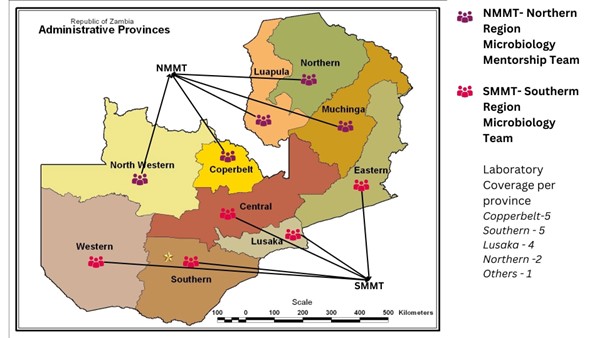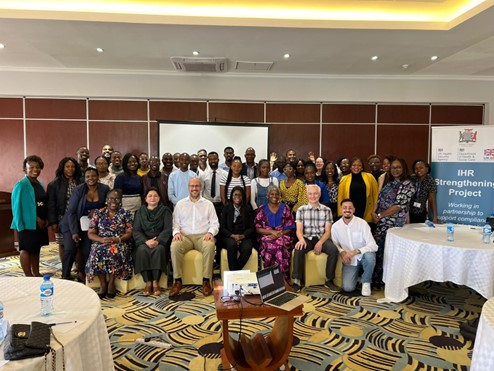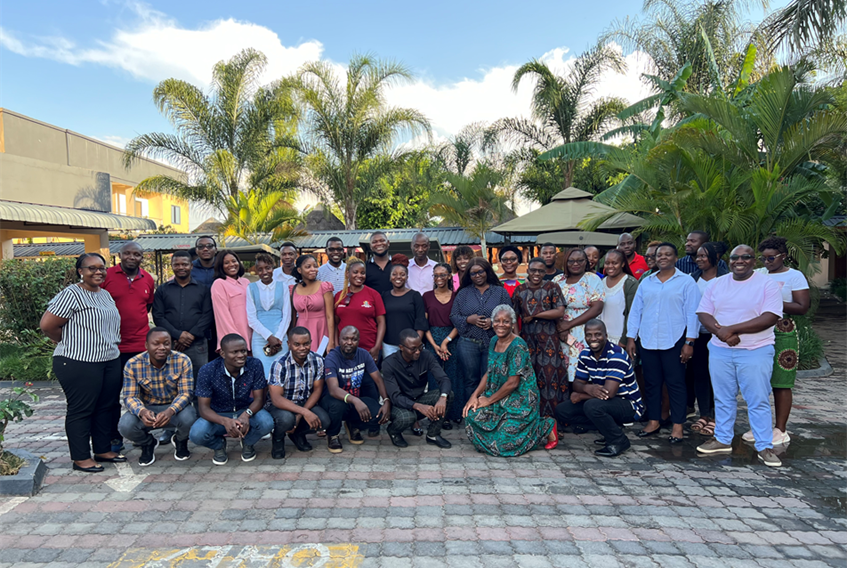
The UK Health Security Agency (UKHSA) International Health Regulations Strengthening Project (IHR-SP) works in collaboration with the Ministry of Health Zambia (MOHZ), to strengthen technical capability, enhance leadership and public health networks. The laboratory team has been working in Zambia since 2020.
Using a mentorship approach alongside training with emphasis on diagnostics, quality management, biosafety biosecurity and leadership, a network of laboratory scientists working across five laboratories in a single province was formed in 2022 – the Copperbelt Microbiology Team (CBMT). An internal qualitative review found that the CBMT network improved laboratory performance and increased coordination between laboratories. CBMT had increased visibility and engagement with MOHZ and as a result, laboratory scientists from the Southern province requested support from UKHSA IHR-SP through the MOHZ to form the Southern Province Microbiology Network (SPMT) in 2023.
 Following the establishment and perceived impact of CBMT and SPMT, the MOHZ requested the roll out of microbiology testing improvement and strengthening activities by expansion of the network to cover all the ten provinces in Zambia. This would also ensure equity and consistency of microbiology strengthening country wide.
Following the establishment and perceived impact of CBMT and SPMT, the MOHZ requested the roll out of microbiology testing improvement and strengthening activities by expansion of the network to cover all the ten provinces in Zambia. This would also ensure equity and consistency of microbiology strengthening country wide.
Co-designing a national network

The IHR-SP team was tasked with working with MOHZ representatives to establish a roadmap for development of a National Microbiology Network. This meant creating a Zambia National Microbiology Mentorship Team.
Criteria for participation were agreed with MOHZ to ensure the transparent selection of dedicated participants with the ability to cascade training in their labs and within their provinces. Based on these criteria, the MOHZ selected 60 members.
The national team is divided into two regions: the Northern and the Southern region with 30 core members per region covering 22 level two and level three laboratories, including the Zambia National Public Health Reference Laboratory.
Delivering the first mentorship sessions for the new national microbiology teams
The first national mentorship sessions took place in November 2024, in Ndola for the Northern region and Lusaka for the Southern region. Sixty participants were trained at both sessions with a MOHZ representative attending both mentorship sessions.
The programme was developed with the leadership of CBMT and SPMT and aligned to MOHZ priorities, such as the detection of common pathogens isolated from the lower respiratory tract, in line with the National Multi-Pathogen Diagnostic Programme. Other topics covered in the mentorship included risk assessment of emerging pathogens and resolution of nonconformities from the 2024 enteric pathogen National External Quality Assessment (UK NEQAS) distribution. Personal development topics such as creativity, innovation and resilience were also delivered supporting the teams’ request for tools to work effectively in a resource limited setting.
Trained facilitators from the CBMT and SPMT supported the delivery of the topics alongside IHR-SP technical advisors and MOHZ leadership representatives.
At the end of the sessions, participants created laboratory specific action plans, including reviewing outstanding External Quality Assessment (EQA) reports and closing outstanding nonconformities, completing, and reviewing risk assessments, and advocating for laboratory resources using creative methods explored during the sessions.
Feedback from participants was overwhelmingly positive, with all 60 participants (100%) reporting that the objectives were well explained and met, and that the sessions were useful and applicable to their job.
The future of microbiology mentorship in Zambia
Membership and effectiveness of the national network is poised to grow as the leadership and governance by the MOHZ is established both at the province and national level.
Dr Jumoke Sule, Head of the IHR-SP Laboratory Strengthening Team said:
“Thanks to our longstanding and successful partnership with the Ministry of Health in Zambia, it is fantastic to have grown the microbiology mentorship networks from one province to a national footprint. By listening to the priorities of the Ministry of Health and identifying areas to improve microbiology laboratory practice, we have co-developed a national network of laboratory scientists with the aim of strengthening clinical and public health microbiology across Zambia. We look forward to supporting the network to deliver the Ministry of Health's mission to ‘provide equitable access to cost effective, quality healthcare services as close to the family as possible’.”

Southern Region Microbiology mentorship team and IHR-SP laboratory strengthening team seen here in Lusaka with Patricia Kafweta MOHZ laboratory division representative, Ashley Sharp IHR-SP Zambia Country Lead.

Northern Region Microbiology Mentorship Team meeting in Ndola, Copperbelt Province